Charles E W Bean, Diaries, AWM38 3DRL 606/238/1 - March 1917 - Part 2
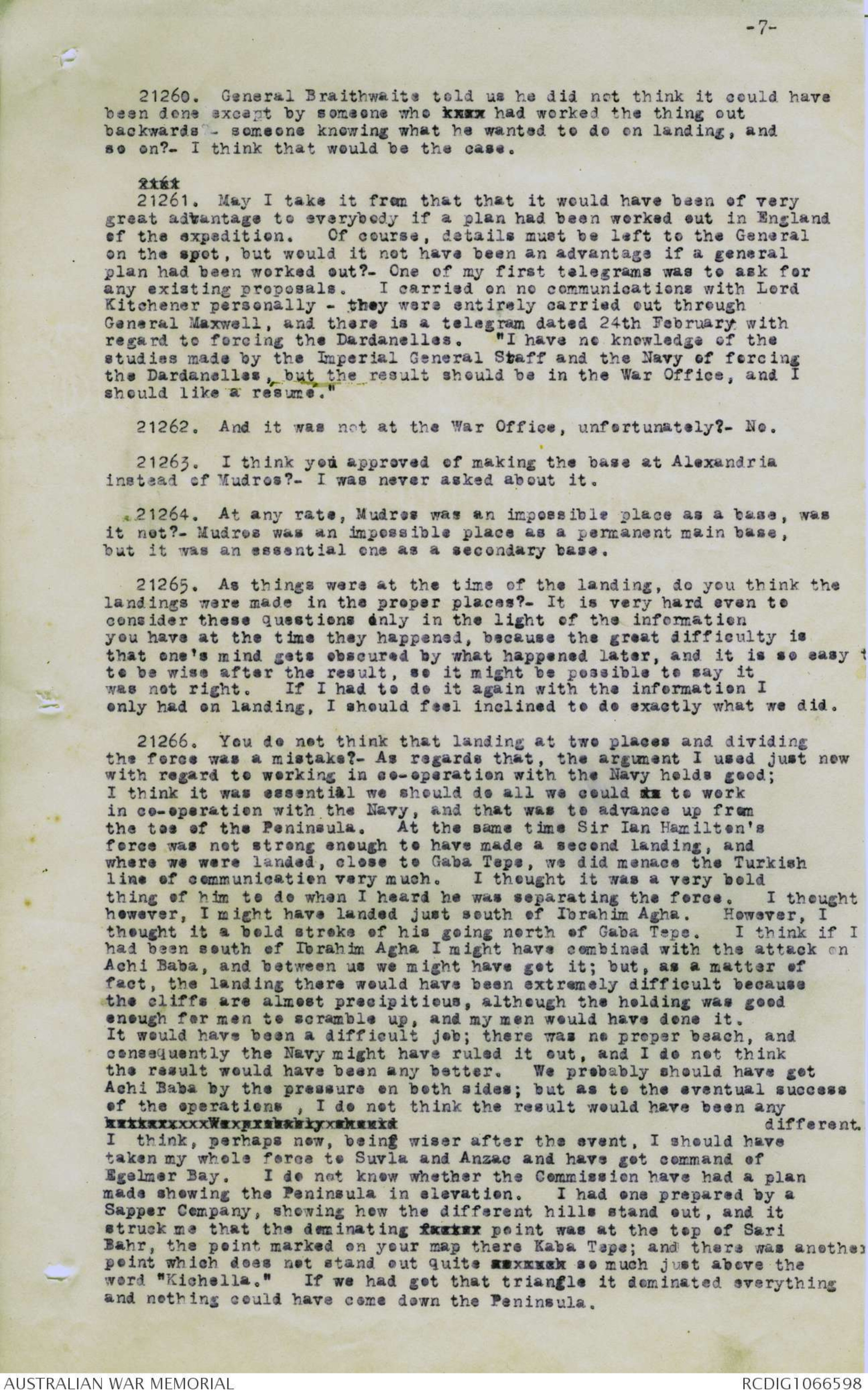
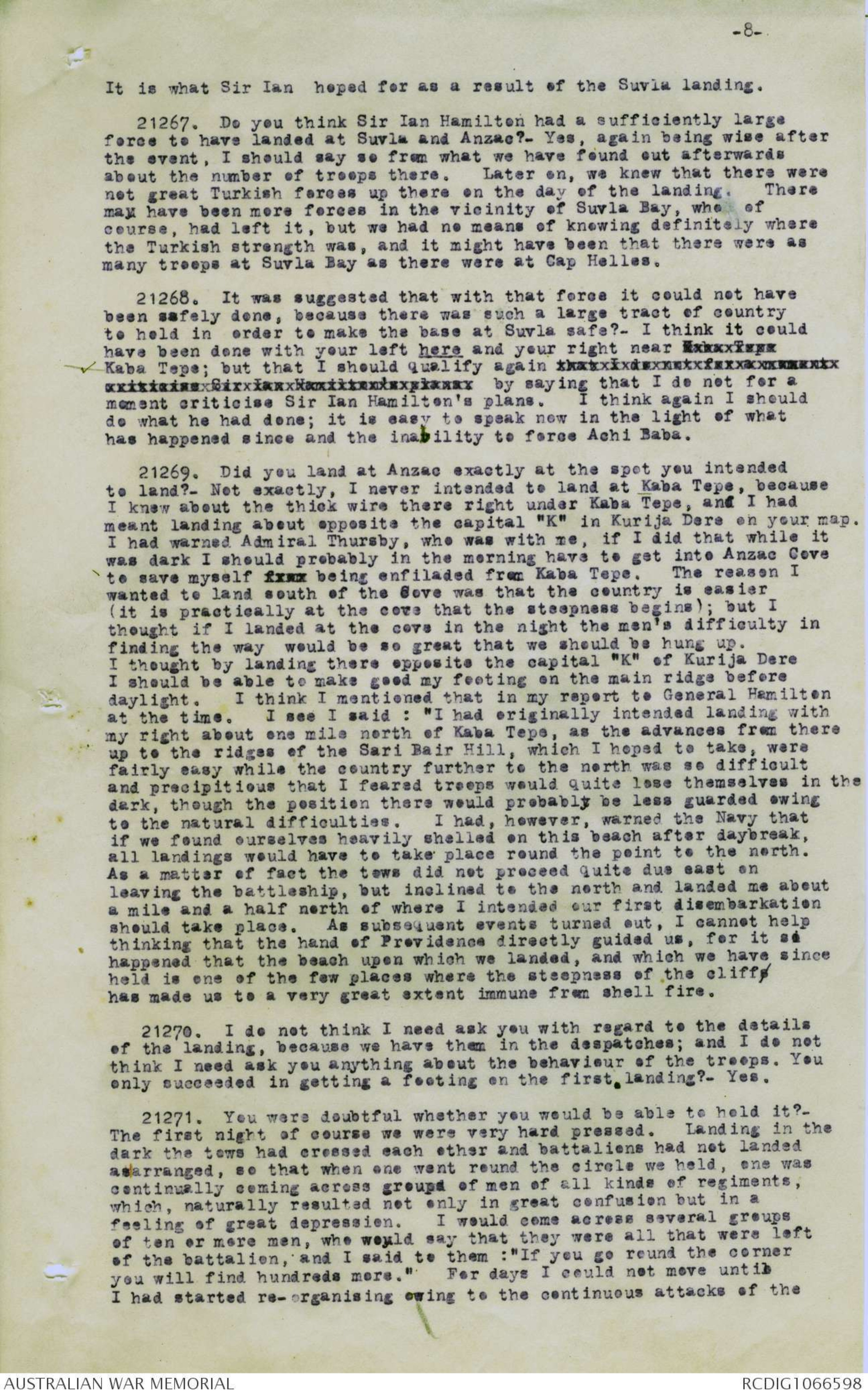
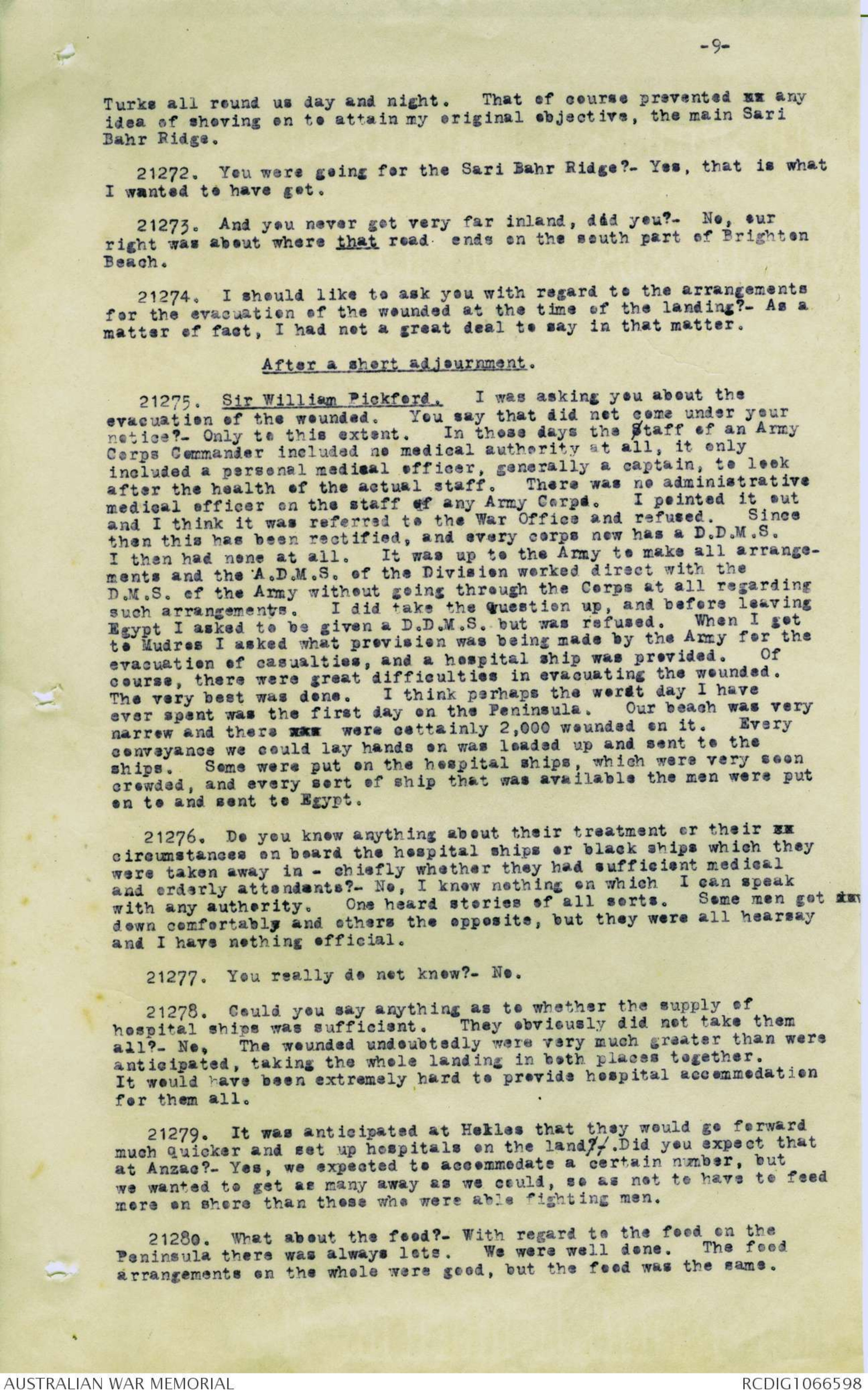
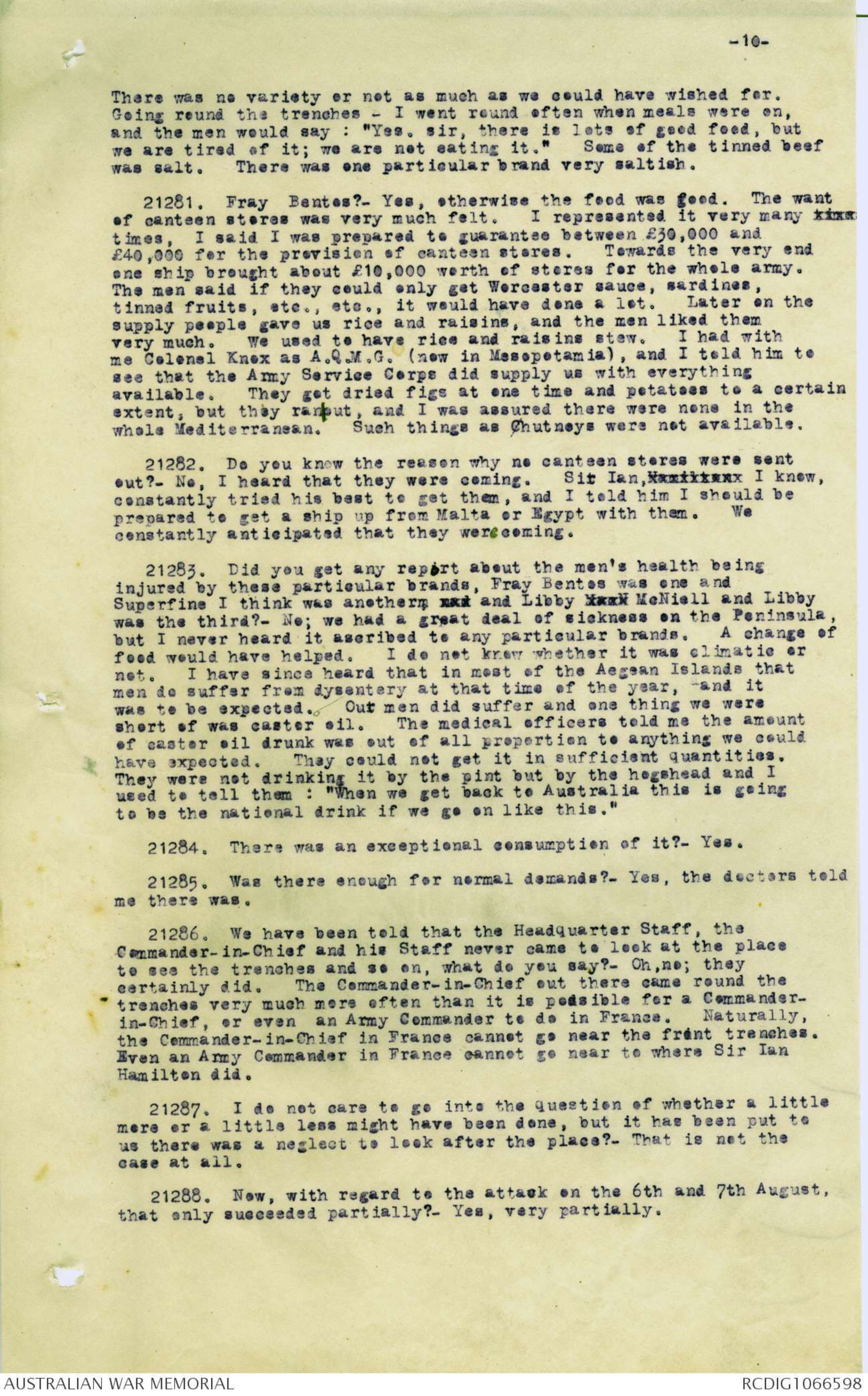
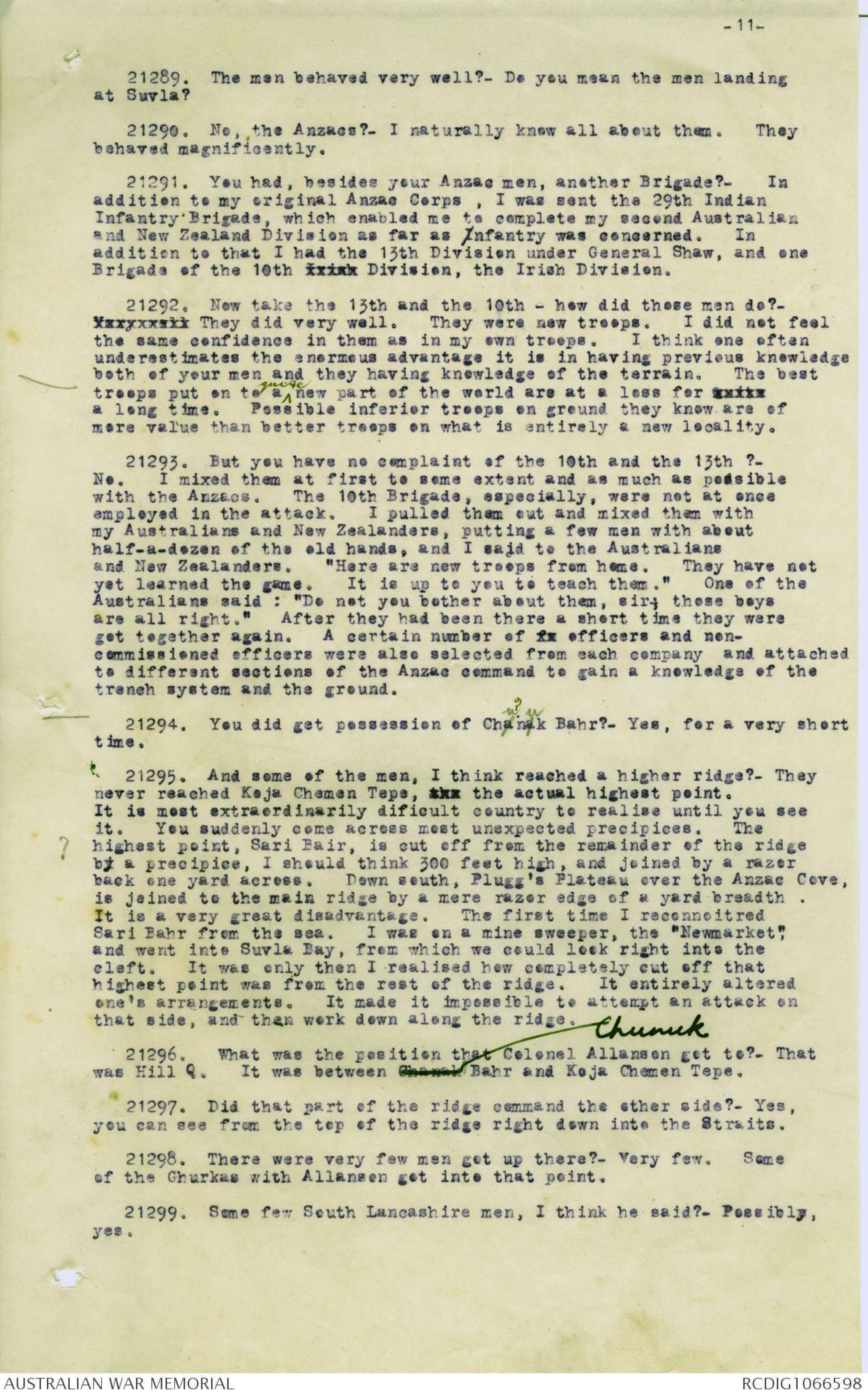
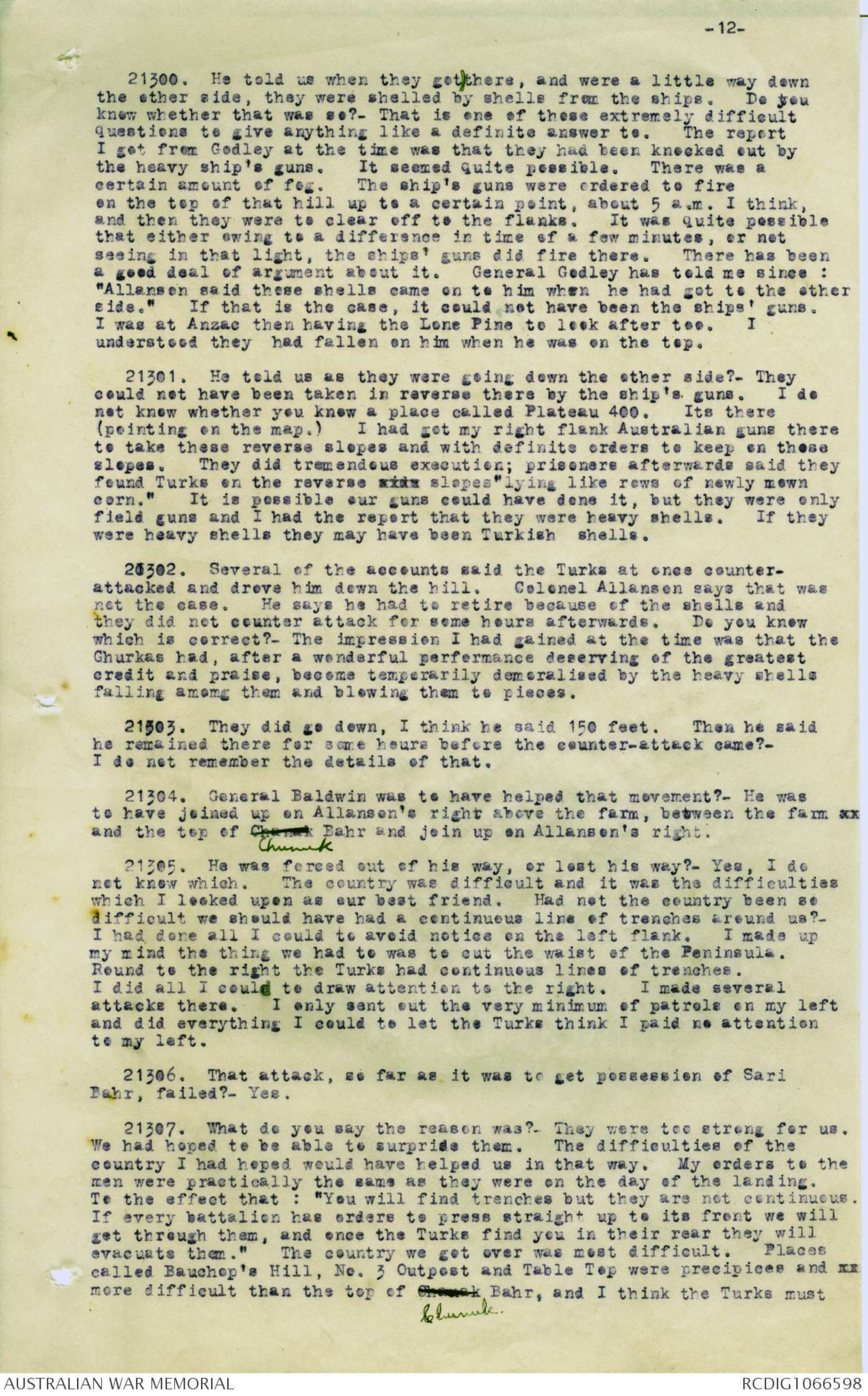
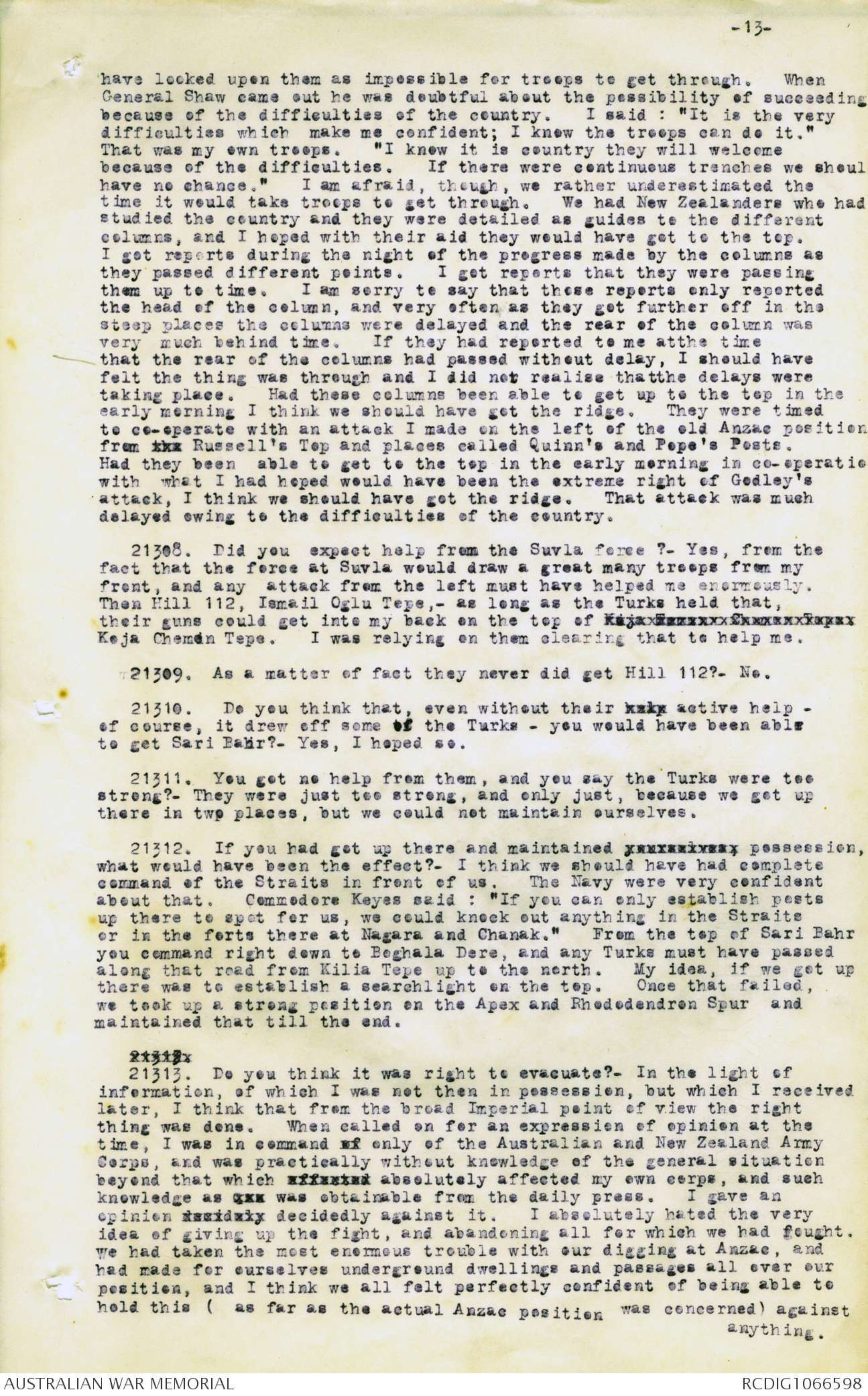
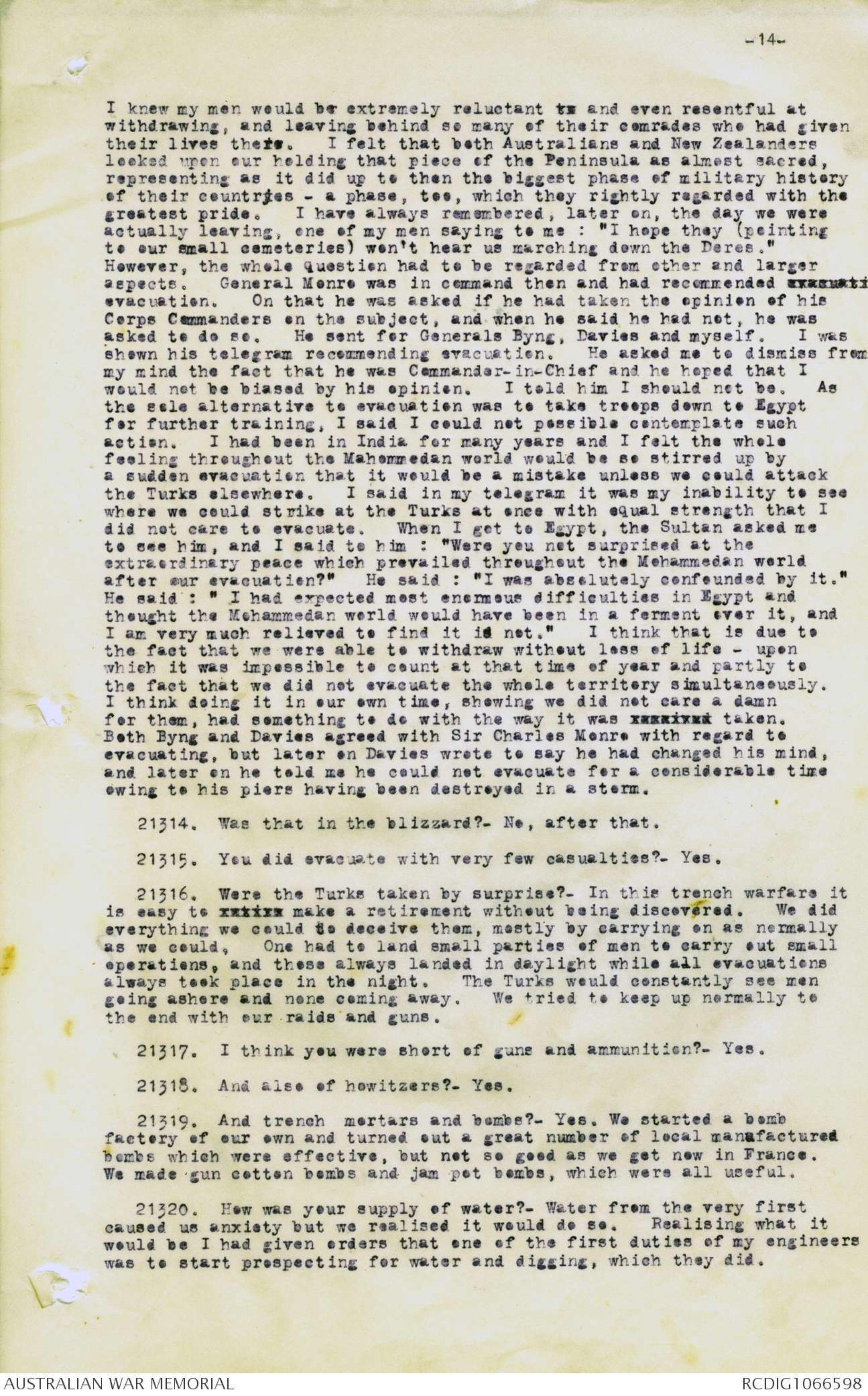
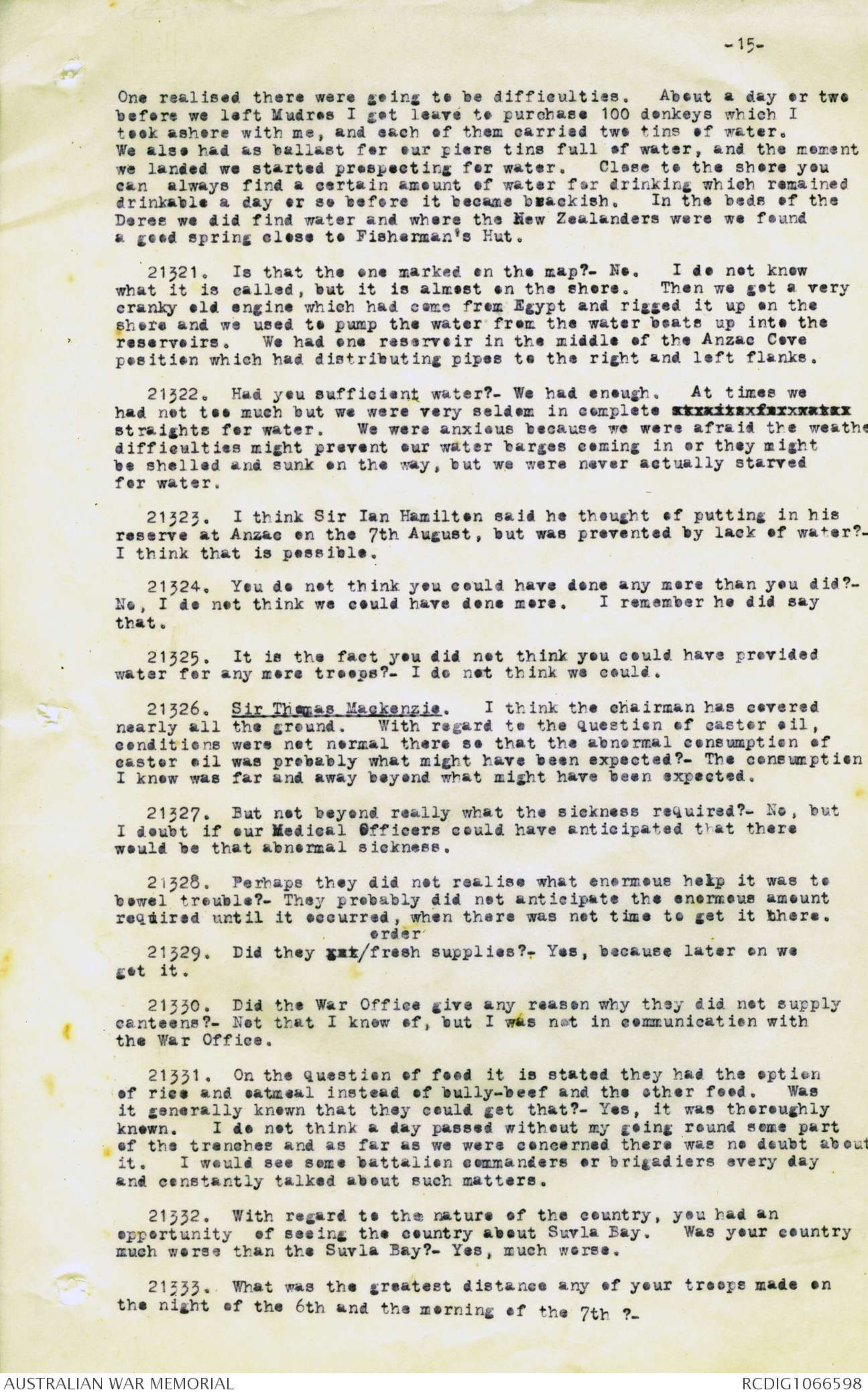
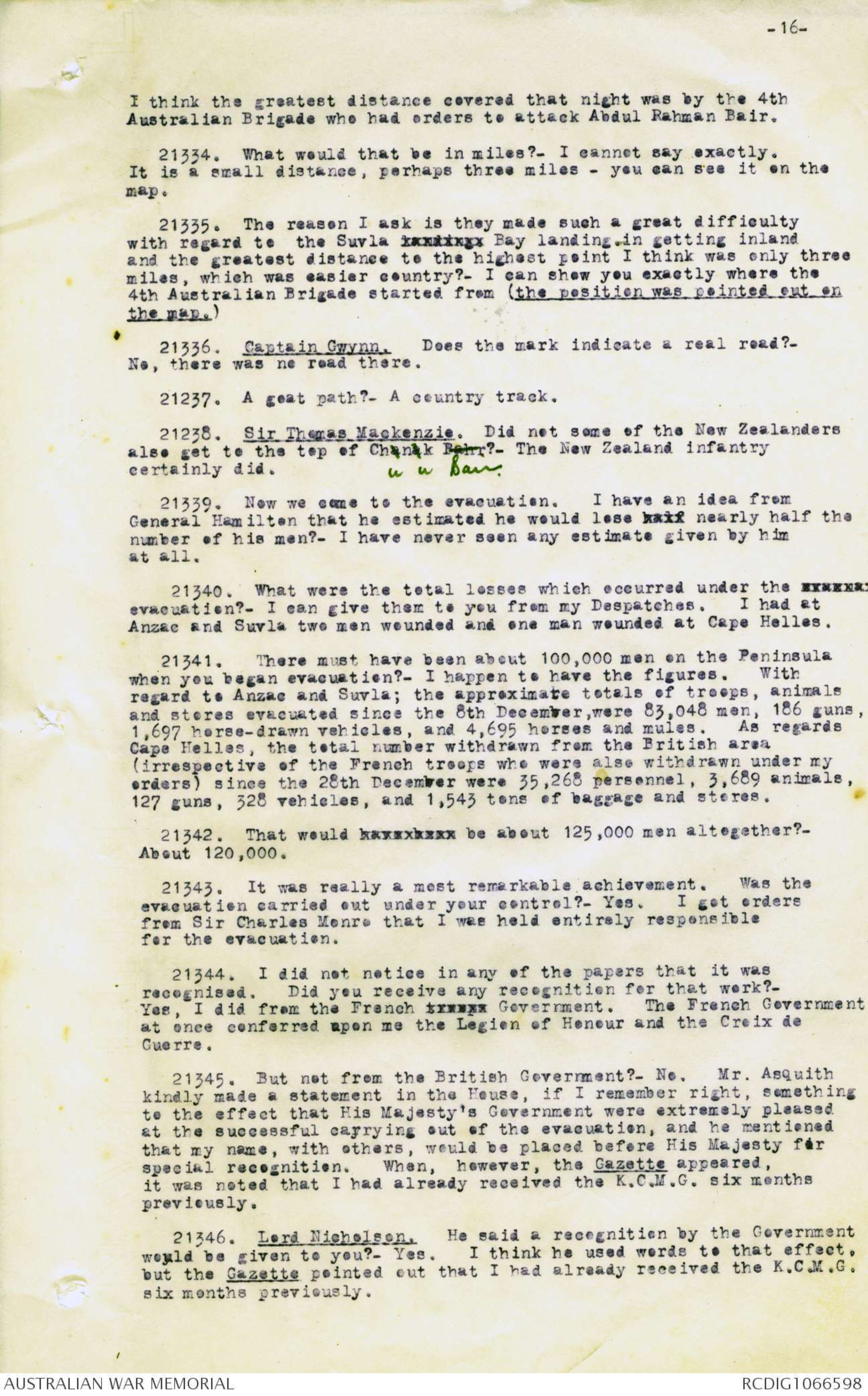
-7-
21260. General Braithwaite told us he did not think it could have
been done except by someone who knew had worked the thing out
backwards?- someone knowing what he wanted to do on landing, and
so on?- I think that would be the case.2161
21261. May I take it from that that it would have been of very
great advantage to everybody if a plan had been worked out in England
of the expedition. Of course, details must be left to the General
on the spot, but would it not have been an advantage if a general
plan had been worked out?- One of my first telegrams was to ask for
any existing proposals. I carried on no communications with Lord
Kitchener personally - they were entirely carried out through
General Maxwell, and there is a telegram dated 24th February with
regard to forcing the Dardanelles. "I have no knowledge of the
studies made by the Imperial General Staff and the Navy of forcing
the Dardanelles, but the result should be in the War Office, and I
should like a rēsumē."
21262. And it was not at the War Office, unfortunately?- No.
21263. I think you approved of making the base at Alexandria
instead of Mudros?- I was never asked about it.
21264. At any rate, Mudros was an impossible place as a base, was
it not?- Mudros was an impossible place as a permanent main base,
but it was an essential one as a secondary base.
21265. As things were at the time of the landing, do you think the
landings ware made in the proper places?- It is very hard even to
consider these questions only in the light of the information
you have at the time they happened, because the great difficulty is
that one's mind gets obscured by what happened later, and it is so easy t
to be wise after the result, so it might be possible to say it
was not right. If I had to do it again with the information I
only had on landing, I should feel inclined to do exactly what we did.
21266. You do not think that landing at two places and dividing
the force was a mistake?- As regards that, the argument I used just now
with regard to working in co-operation with the Navy holds good;
I think it was essential we should do all we could do to work
in co-operation with the Navy, and that was to advance up from
the toe of the Peninsula. At the same time Sir Ian Hamilton's
force was not strong enough to have made a second landing, and
where we were landed, close to Gaba Tepe, we did menace the Turkish
line of communication very much. I thought it was a very bold
thing of him to do when I heard he was separating the force. I thought
however, I might have landed just south of Ibrahim Agha. However, I
thought it a bold stroke of his going north of Gaba Tepe. I think if I
had been south of Ibrahim Agha I might have combined with the attack on
Achi Baba, and between us we might have got it; but, as a matter of
fact, the landing there would have been extremely difficult because
the cliffs are almost precipitious, although the holding was good
enough for men to scramble up, and my men would have done it.
It would have been a difficult job; there was no proper beach, and
consequently the Navy might have ruled it out, and I do not think
the result would have been any better. We probably should have got
Achi Baba by the pressure on both sides; but as to the eventual success
of the operations, I do not think the result would have been anyxxxxxxxxxxxxxxxxxxxxxxxxxxxx different.
I think, perhaps now, being wiser after the event, I should have
taken my whole force to Suvla and Anzac and have got command of
Egelmer Bay. I do not know whether the Commission have had a plan
made showing the Peninsula in elevation. I had one prepared by a
Sapper Company, showing how the different hills stand out, and it
struck me that the dominating factor point was at the top of Sari
Bahr, the point marked on your map there Kaba Tepe; and there was another
point which does not stand out quite soxmuch so much just above the
word "Kichella." If we had got that triangle it dominated everything
and nothing could have come down the Peninsula.
-8-
It is what Sir lan hoped for as a result of the Suvla landing.
21267. Do you think Sir Ian Hamilton had a sufficiently large
force to have landed at Suvla and Anzac?- Yes, again being wise after
the event, I should say so from what we have found out afterwards
about the number of troops there. Later on, we knew that there were
not great Turkish forces up there on the day of the landing. There
may have been more forces in the vicinity of Suvla Bay, who of
course, had left it, but we had no means of knowing definitely where
the Turkish strength was, and it might have been that there were as
many troops at Suvla Bay as there were at Cap Helles.
21268. It was suggested that with that force it could not have
been safely done, because there was such a large tract of country
to hold in order to make the base at Suvla safe?- I think it could
have been done with your left here and your right near xxxxxTepe
[*√*] Kaba Tepe; but that I should qualify again that I do not for a momentcriticise Sir Ian Hamilton's plans by saying that I do not for a
moment criticise Sir Ian Hamilton's plans. I think again I should
do what he had done; it is easy to speak now in the light of what
has happened since and the inability to force Achi Baba.
21269. Did you land at Anzac exactly at the spot you intended
to land?- Not exactly, I never intended to land at Kaba Tepe, because
I knew about the thick wire there right under Kaba Tepe, and I had
meant landing about opposite the capital "K" in Kurija Dere on your map.
I had warned Admiral Thursby, who was with me, if I did that while it
was dark I should probably in the morning have to get into Anzac Cove
to save myself from being enfiladed from Kaba Tepe. The reason I
wanted to land south of the cove was that the country is easier
(it is practically at the cove that the steepness begins); but I
thought if I landed at the cove in the night the men's difficulty in
finding the way would be so great that we should be hung up.
I thought by landing there opposite the capital "K" of Kurija Dere
I should be able to make good my footing on the main ridge before
daylight. I think I mentioned that in my report to General Hamilton
at the time. I see I said : "I had originally intended landing with
my right about one mile north of Kaba Tepe, as the advances from there
up to the ridges of the Sari Bair Hill, which I hoped to take, were
fairly easy while the country further to the north was so difficult
and precipitious that I feared troops would quite lose themselves in the
dark, though the position there would probably be less guarded owing
to the natural difficulties. I had, however, warned the Navy that
if we found ourselves heavily shelled on this beach after daybreak,
all landings would have to take place round the point to the north.
As a matter of fact the tows did not proceed quite due east on
leaving the battleship, but inclined to the north and landed me about
a mile and a half north of where I intended our first disembarkation
should take place. As subsequent events turned out, I cannot help
thinking that the hand of Providence directly guided us, for it so
happened that the beach upon which we landed, and which we have since
held is one of the few places where the steepness of the cliffs
has made us to a very great extent immune from shell fire.
21270. I do not think I need ask you with regard to the details
of the landing, because we have them in the despatches; and I do not
think I need ask you anything about the behaviour of the troops. You
only succeeded in getting a footing on the first, landing?- Yes.
21271. You were doubtful whether you would be able to hold it?-
The first night of course we were very hard pressed. Landing in the
dark the tows had crossed each ether and battalions had not landed
as arranged, so that when one went round the circle we held, one was
continually coming across groups of men of all kinds of regiments,
which, naturally resulted not only in great confusion but in a
feeling of great depression. I would come across several groups
of ten or more men, who would say that they were all that were left
of the battalion, and I said to them :"If you go round the corner
you will find hundreds more." For days I could not move until
I had started re-organising owing to the continuous attacks of the
-9-
Turks all round us day and night. That of course prevented xx any
idea of shoving on to attain my original objective, the main Sari
Bahr Ridge.
21272. You were going for the Sari Bahr Ridge?- Yes, that is what
I wanted to have got.
21273. And you never got very far inland, did you?- No, our
right was about where that road ends on the south part of Brighton
Beach.
21274. I should like to ask you with regard to the arrangements
for the evacuation of the wounded at the time of the landing?- As a
matter of fact, I had not a great deal to say in that matter.
After a short adjournment.
21275. Sir William Pickford. I was asking you about the
evacuation of the wounded. You say that did not come under your
notice?- Only to this extent. In these days the Staff of an Army
Corps Commander included no medical authority at all, it only
included a personal medical officer, generally a captain, to look
after the health of the actual staff. There was no administrative
medical officer on the staff of any Army Corps. I pointed it out
and I think it was referred to the War Office and refused. Since
then this has been rectified, and every corps now has a D.D.M.S.
I then had none at all. It was up to the Army to make all arrangements
and the A.D.M.S. of the Division worked direct with the
D.M.S. of the Army without going through the Corps at all regarding
such arrangements. I did take the question up, and before leaving
Egypt I asked to be given a D.D.M.S. but was refused. When I got
to Mudros I asked what provision was being made by the Army for the
evacuation of casualties, and a hospital ship was provided. Of
course, there were great difficulties in evacuating the wounded.
The very best was done. I think perhaps the worst day I have
ever spent was the first day on the Peninsula. Our beach was very
narrow and there was were certainly 2,000 wounded on it. Every
conveyance we could lay hands on was loaded up and sent to the
ships. Some were put on the hospital ships, which were very soon
crowded, and every sort of ship that was available the men were put
on to and sent to Egypt.
21276. Do you know anything about their treatment or their xx
circumstances on board the hospital ships or black ships which they
were taken away in - chiefly whether they had sufficient medical
and orderly attendants?- No, I know nothing on which I can speak
with any authority. One heard stories of all sorts. Some men got dow
down comfortably and others the opposite, but they were all hearsay
and I have nothing official.
21277. You really do not know?- No.
21278. Could you say anything as to whether the supply of
hospital ships was sufficient. They obviously did not take them
all?- No, The wounded undoubtedly were very much greater than were
anticipated, taking the whole landing in both places together.
It would have been extremely hard to provide hospital accommodation
for them all.
21279. It was anticipated at Helles that they would go forward
much quicker and set up hospitals on the land?-Did you expect that
at Anzac?- Yes, we expected to accommodate a certain number, but
we wanted to get as many away as we could, so as not to have to feed
more on shore than those who were able fighting men.
21280. What about the food?- With regard to the food on the
Peninsula there was always lots. We were well done. The food
arrangements on the whole were good, but the food was the same.
-10-
There was no variety or not as much as we could have wished for.
Going round the trenches - I went round often when meals were on,
and the men would say : "Yes. sir, there is lots of good food, but
we are tired of it; we are not eating it." Some of the tinned beef
was salt. There was one particular brand very saltish.
21281. Fray Bentos?- Yes, otherwise the food was good. The want
of canteen stores was very much felt. I represented it very many time
times, I said I was prepared to guarantee between £30,000 and
£40,000 for the provision of canteen stores. Towards the very end
one ship brought about £10,000 worth of stores for the whole army.
The men said if they could only get Worcester sauce, sardines,
tinned fruits, etc., etc., it would have done a lot. Later on the
supply people gave us rice and raisins, and the men liked them
very much. We used to have rice and raisins stew. I had with
me Colonel Knox as A.Q.M.G. (now in Mesopotamia), and I told him to
see that the Army Service Corps did supply us with everything
available. They got dried figs at one time and potatoes to a certain
extent, but they ran out, and I was assured there were none in the
whole Mediterranean. Such things as Chutneys were not available.
21282. Do you know the reason why no canteen stores were sent
out?- No, I heard that they were coming. Sir Ian, Hamiltonx I know,
constantly tried his best to get them, and I told him I should be
prepared to get a ship up from Malta or Egypt with them. We
constantly anticipated that they were coming.
21283. Did you get any report about the men's health being
injured by these particular brands, Fray Bentos was one and
Superfine I think was anotherm xxx and Libby MacN McNiell and Libby
was the third?- No; we had a great deal of sickness on the Peninsula,
but I never heard it ascribed to any particular brands. A change of
food would have helped. I do not know whether it was climatic or
not. I have since heard that in most of the Aegean Islands that
men do suffer from dysentery at that time of the year, -and it
was to be expected. Our men did suffer and one thing we were
short of was castor oil. The medical officers told me the amount
of castor oil drunk was out of all proportion to anything we could
have expected. They could not get it in sufficient quantities.
They were not drinking it by the pint but by the hogshead and I
used to tell them : "When we get back to Australia this is going
to be the national drink if we go on like this."
21284. There was an exceptional consumption of it?- Yes.
21285. Was there enough for normal demands?- Yes, the doctors told
me there was.
21286. We have been told that the Headquarter Staff, the
Commander-in-Chief and his Staff never came to look at the place
to see the trenches and so on, what do you say?- Oh,no; they
certainly did. The Commander-in-Chief out there came round the
trenches very much more often than it is possible for a Commander-
in-Chief, or even an Army Commander to do in France. Naturally,
the Commander-in-Chief in France cannot go near the front trenches.
Even an Army Commander in France cannot go near to where Sir Ian
Hamilton did.
21287. I do not care to go into the question of whether a little
more or a little less might have been done, but it has been put to
us there was a neglect to look after the place?- That is not the
case at all.
21288. Now, with regard to the attack on the 6th and 7th August,
that only succeeded partially?- Yes, very partially.
-11-
21289. The men behaved very well?- Do you mean the men landing
at Suvla?
21290. No, the Anzacs?- I naturally know all about them. They
behaved magnificently.
21291. You had, besides your Anzac men, another Brigade?- In
addition to my original Anzac Corps, I was sent the 29th Indian
Infantry Brigade, which enabled me to complete my second Australian
and New Zealand Division as far as Infantry was concerned. In
addition to that I had the 13th Division under General Shaw, and one
Brigade of the 10th Irish Division, the Irish Division.
21292. Now take the 13th and the 10th - how did these men do?-Veryxwell They did very well. They were new troops. I did not feel
the same confidence in them as in my own troops. I think one often
underestimates the enormous advantage it is in having previous knowledge
both of your men and they having knowledge of the terrain. The best
troops put on to a ^quite new part of the world are at a loss for quite
a long time. Possible inferior troops on ground they know are of
more value than better troops on what is entirely a new locality.
21293. But you have no complaint of the 10th and the 13th ?-
No. I mixed them at first to some extent and as much as possible
with the Anzacs. The 10th Brigade, especially, were not at once
employed in the attack. I pulled them out and mixed then with
my Australians and New Zealanders, putting a few men with about
half-a-dozen of the old hands, and I said to the Australians
and New Zealanders. "Here are new troops from home. They have not
yet learned the game. It is up to you to teach them." One of the
Australians said : "Do not you bother about them, sir; these boys
are all right." After they had been there a short time they were
got together again. A certain number of xx officers and non-commissioned
officers were also selected from each company and attached
to different sections of the Anzac command to gain a knowledge of the
trench system and the ground.
21294. You did get possession of Chau?nauk Bahr?- Yes, for a very short
time.
21295. And some of the men, I think reached a higher ridge?- They
never reached Koja Chemen Tepe, xxx the actual highest point.
It is most extraordinarily dificult country to realise until you see
it. You suddenly come across most unexpected precipices. The
[*?*] highest point, Sari Bair, is cut off from the remainder of the ridge
by a precipice, I should think 300 feet high, and joined by a razor
back one yard across. Down south, Plugg's Plateau over the Anzac Cove,
is joined to the main ridge by a mere razor edge of a yard breadth.
It is a very great disadvantage. The first time I reconnoitred
Sari Bahr from the sea. I was on a mine sweeper, the "Newmarket",
and went into Suvla Bay, from which we could look right into the
cleft. It was only then I realised how completely cut off that
highest point was from the rest of the ridge. It entirely altered
one's arrangements. It made it impossible to attempt an attack on
that side, and then work down along the ridge.
21296. What was the position that Colonel Allanson got to?- That
was Hill Q. It was between Chanak Chunuk Bahr and Koja Chemen Tepe.
21297. Did that part of the ridge command the other side?- Yes,
you can see from the top of the ridge right down into the Straits.
21298. There were very few men got up there?- Very few. Some
of the Ghurkas with Allanson got into that point.
21299. Some few South Lancashire men, I think he said?- Possibly,
yes.
-12-
21300. He told us when they got there, and were a little way down
the other side, they were shelled by shells from the ships. Do you
know whether that was so?- That is one of these extremely difficult
questions to give anything like a definite answer to. The report
I got from Godley at the time was that they had been knocked out by
the heavy ship's guns. It seemed quite possible. There was a
certain amount of fog. The ship's guns were ordered to fire
on the top of that hill up to a certain point, about 5 a.m. I think,
and then they were to clear off to the flanks. It was quite possible
that either owing to a difference in time of a few minutes, or not
seeing in that light, the ships' guns did fire there. There has been
a good deal of argument about it. General Godley has told me since :
"Allanson said these shells came on to him when he had got to the other
side." If that is the case, it could not have been the ships' guns.
I was at Anzac then having the Lone Pine to look after too. I
understood they had fallen on him when he was on the top.
21301. He told us as they were going down the other side?- They
could not have been taken in reverse there by the ship's guns. I do
not know whether you know a place called Plateau 400. Its there
(pointing on the map.) I had got my right flank Australian guns there
to take these reverse slopes and with definite orders to keep on those
slopes. They did tremendous execution; prisoners afterwards said they
found Turks on the reverse side slopes "lying like rows of newly mown
corn." It is possible our guns could have done it, but they were only
field guns and I had the report that they were heavy shells. If they
were heavy shells they may have been Turkish shells.
21302. Several of the accounts said the Turks at once counter-attacked
and drove him down the hill. Colonel Allanson says that was
not the case. He says he had to retire because of the shells and
they did not counter attack for some hours afterwards. Do you know
which is correct?- The impression I had gained at the time was that the
Ghurkas had, after a wonderful performance deserving of the greatest
credit and praise, become temporarily demoralised by the heavy shells
falling amomg them and blowing them to pieces.
21303. They did go down, I think he said 150 feet. Then he said
he remained there for some hours before the counter-attack came?-
I do not remember the details of that.
21304. General Baldwin was to have helped that movement?- He was
to have joined up on Allanson's right above the farm, between the farm xx
and the top of Chanak Chunuk Bahr and join up on Allanson's right.
21305. He was forced out of his way, or lost his way?- Yes, I do
not know which. The country was difficult and it was the difficulties
which I looked upon as our best friend. Had not the country been so
difficult we should have had a continuous line of trenches around us?-
I had done all I could to avoid notice on the left flank. I made up
my mind the thing we had to was to cut the waist of the Peninsula.
Round to the right the Turks had continuous lines of trenches.
I did all I could to draw attention to the right. I made several
attacks there. I only sent out the very minimum of patrols on my left
and did everything I could to let the Turks think I paid no attention
to my left.
21306. That attack, so far as it was to get possession of Sari
Bahr, failed?- Yes.
21307. What do you say the reason was?- They were too strong for us.
We had hoped to be able to surprise them. The difficulties of the
country I had hoped would have helped us in that way. My orders to the
men were practically the same as they were on the day of the landing.
To the effect that : "You will find trenches but they are not continuous.
If every battalion has orders to press straight up to its front we will
get through them, and once the Turks find you in their rear they will
evacuate them." The country we got over was most difficult. Places
called Bauchop's Hill, No. 3 Outpost and Table Top were precipices and xx
more difficult than the top of Chanak Chunuk Bahr, and I think the Turks must
-13-
have looked upon them as impossible for troops to get through. When
General Shaw came out he was doubtful about the possibility of succeeding
because of the difficulties of the country. I said : "It is the very
difficulties which make me confident; I know the troops can do it."
That was my own troops. "I know it is country they will welcome
because of the difficulties. If there were continuous trenches we shoul
have no chance." I am afraid, though, we rather underestimated the
time it would take troops to get through. We had New Zealanders who had
studied the country and they were detailed as guides to the different
columns, and I hoped with their aid they would have got to the top.
I got reports during the night of the progress made by the columns as
they passed different points. I got reports that they were passing
them up to time. I am sorry to say that these reports only reported
the head of the column, and very often as they got further off in the
steep places the columns were delayed and the rear of the column was
very much behind time. If they had reported to me at the time
that the rear of the columns had passed without delay, I should have
felt the thing was through and I did not realise that the delays were
taking place. Had these columns been able to get up to the top in the
early morning I think we should have got the ridge. They were timed
to co-operate with an attack I made on the left of the old Anzac position
from xxx Russell's Top and places called Quinn's and Pope's Posts.
Had they been able to get to the top in the early morning in co-operatio
with what I had hoped would have been the extreme right of Godley's
attack, I think we should have got the ridge. That attack was much
delayed owing to the difficulties of the country.
21308. Did you expect help from the Suvla force ?- Yes, from the
fact that the force at Suvla would draw a great many troops from my
front, and any attack from the left must have helped me enormously.
Then Hill 112, Ismail Oglu Tepe,- as long as the Turks held that,
their guns could get into my back on the top of KejaxTxxxChemenxTepex
Keja Chemen Tepe. I was relying on them clearing that to help me.
21309. As a matter of fact they never did get Hill 112?- No.
21310. Do you think that, even without their xxxx active help -
of course, it drew off some of the Turks - you would have been able
to get Sari Bahr?- Yes, I hoped so.
21311. You get no help from them, and you say the Turks were too
strong?- They were just too strong, and only just, because we got up
there in two places, but we could not maintain ourselves.
21312. If you had got up there and maintained yourxxxxxxxxxx possession,
what would have been the effect?- I think we should have had complete
command of the Straits in front of us. The Navy were very confident
about that. Commodore Keyes said : "If you can only establish posts
up there to spot for us, we could knock out anything in the Straits
or in the forts there at Nagara and Chanak." From the top of Sari Bahr
you command right down to Boghala Dere, and any Turks must have passed
along that road from Kilia Tepe up to the north. My idea, if we got up
there was to establish a searchlight on the top. Once that failed
we took up a strong position on the Apex and Rhododendron Spur and
maintained that till the end.2131xx
21313. Do you think it was right to evacuate?- In the light of
information, of which I was not then in possession, but which I received
later, I think that from the broad Imperial point of view the right
thing was done. When called on for an expression of opinion at the
time, I was in command of only of the Australian and New Zealand Army
Corps, and was practically without knowledge of the general situation
beyond that which affected absolutely affected my own corps, and such
knowledge as xxx was obtainable from the daily press. I gave an
opinion xxxxdxxx decidedly against it. I absolutely hated the very
idea of giving up the fight, and abandoning all for which we had fought.
We had taken the most enormous trouble with our digging at Anzac, and
had made for ourselves underground dwellings and passages all over our
position, and I think we all felt perfectly confident of being able to
hold this (as far as the actual Anzac position was concerned) against
anything.
-14-
I knew my men would be extremely reluctant to and even resentful at
withdrawing, and leaving behind so many of their comrades who had given
their lives there. I felt that both Australians and New Zealanders
looked upon our holding that piece of the Peninsula as almost sacred,
representing as it did up to then the biggest phase of military history
of their countries - a phase, too, which they rightly regarded with the
greatest pride. I have always remembered, later on, the day we were
actually leaving, one of my men saying to me : "I hope they (pointing
to our small cemeteries) won't hear us marching down the Deres."
However, the whole question had to be regarded from other and larger
aspects. General Monro was in command then and had recommended evacuati
evacuation. On that he was asked if he had taken the opinion of his
Corps Commanders on the subject, and when he said he had not, he was
asked to do so. He sent for Generals Byng, Davies and myself. I was
shown his telegram recommending evacuation. He asked me to dismiss from
my mind the fact that he was Commander-in-Chief and he hoped that I
would not be biased by his opinion. I told him I should not be. As
the sole alternative to evacuation was to take troops down to Egypt
for further training, I said I could not possible contemplate such
action. I had been in India for many years and I felt the whole
feeling throughout the Mahommedan world would be so stirred up by
a sudden evacuation that it would be a mistake unless we could attack
the Turks elsewhere. I said in my telegram it was my inability to see
where we could strike at the Turks at once with equal strength that I
did not care to evacuate. When I got to Egypt, the Sultan asked me
to see him, and I said to him : "Were you not surprised at the
extraordinary peace which prevailed throughout the Mohammedan world
after our evacuation?" He said : "I was absolutely confounded by it."
He said : "I had expected most enormous difficulties in Egypt and
thought the Mohammedan world would have been in a ferment over it, and
I am very much relieved to find it is not." I think that is due to
the fact that we were able to withdraw without loss of life - upon
which it was impossible to count at that time of year and partly to
the fact that we did not evacuate the whole territory simultaneously.
I think doing it in our own time, showing we did not care a damn
for them, had something to do with the way it was xxxxxxxx taken.
Both Byng and Davies agreed with Sir Charles Monro with regard to
evacuating, but later on Davies wrote to say he had changed his mind,
and later on he told me he could not evacuate for a considerable time
owing to his piers having been destroyed in a storm.
21314. Was that in the blizzard?- No., after that.
21315. You did evacuate with very few casualties?- Yes.
21316. Were the Turks taken by surprise?- In this trench warfare it
is easy to retire make a retirement without being discovered. We did
everything we could to deceive them, mostly by carrying on as normally
as we could. One had to land small parties of men to carry out small
operations, and these always landed in daylight while all evacuations
always took place in the night. The Turks would constantly see men
going ashore and none coming away. We tried to keep up normally to
the end with our raids and guns.
21317. I think you were short of guns and ammunition?- Yes.
21318. And also of howitzers?- Yes.
21319. And trench mortars and bombs?- Yes. We started a bomb
factory of our own and turned out a great number of local manufactured
bombs which were effective, but not so good as we get now in France.
We made gun cotton bombs and jam pot bombs, which were all useful.
21320. How was your supply of water?- Water from the very first
caused us anxiety but we realised it would do so. Realising what it
would be I had given orders that one of the first duties of my engineers
was to start prospecting for water and digging, which they did.
-15-
One realised there were going to be difficulties. About a day or two
before we left Mudros I get leave to purchase 100 donkeys which I
took ashore with me, and each of them carried two tins of water.
We also had as ballast for our piers tins full of water, and the moment
we landed we started prospecting for water. Close to the shore you
can always find a certain amount of water for drinking which remained
drinkable a day or so before it became brackish. In the beds of the
Deres we did find water and where the New Zealanders were we found
a good spring close to Fisherman's Hut.
21321. Is that the one marked on the map?- No. I do not know
what it is called, but it is almost on the shore. Then we got a very
cranky old engine which had come from Egypt and rigged it up on the
shore and we used to pump the water from the water beats up into the
reservoirs. We had one reservoir in the middle of the Anzac Cove
position which had distributing pipes to the right and left flanks.
21322. Had you sufficient water?- We had enough. At times we
had not too much but we were very seldom in complete straits for water
straights for water. We were anxious because we were afraid the weathe
difficulties might prevent our water barges coming in or they might
be shelled and sunk on the way, but we were never actually starved
for water.
21323. I think Sir Ian Hamilton said he thought of putting in his
reserve at Anzac on the 7th August, but was prevented by lack of water?-
I think that is possible.
21324. You do not think you could have done any more than you did?-
No, I do not think we could have done more. I remember he did say
that.
21325. It is the fact you did not think you could have provided
water for any more troops?- I do not think we could.
21326. Sir Thomas Mackenzie. I think the chairman has covered
nearly all the ground. With regard to the question of castor oil,
conditions were not normal there so that the abnormal consumption of
castor oil was probably what might have been expected?- The consumption
I know was far and away beyond what might have been expected.
21327. But not beyond really what the sickness required?- No, but
I doubt if our Medical Officers could have anticipated that there
would be that abnormal sickness.
21328. Perhaps they did not realise what enormous help it was to
bowel trouble?- They probably did not anticipate the enormous amount
required until it occurred, when there was not time to get it there.
21329. Did they get ^order fresh supplies?- Yes, because later on we
got it.
21330. Did the War Office give any reason why they did not supply
canteens?- Not that I know of, but I was not in communication with
the War Office.
21331. On the question of food it is stated they had the option
of rice and oatmeal instead of bully-beef and the other food. Was
it generally known that they could get that?- Yes, it was thoroughly
known. I do not think a day passed without my going round some part
of the trenches and as far as we were concerned there was no doubt about
it. I would see some battalion commanders or brigadiers every day
and constantly talked about such matters.
21332. With regard to the nature of the country, you had an
opportunity of seeing the country about Suvla Bay. Was your country
much worse than the Suvla Bay?- Yes, much worse.
21333. What was the greatest distance any of your troops made on
the night of the 6th and the morning of the 7th ?-
-16-
I think the greatest distance covered that night was by the 4th
Australian Brigade who had orders to attack Abdul Rahman Bair.
21334. What would that be in miles?- I cannot say exactly.
It is a small distance, perhaps three miles - you can see it on the
map.
21335. The reason I ask is they made such a great difficulty
with regard to the Suvla landing Bay landing in getting inland
and the greatest distance to the highest point I think was only three
miles, which was easier country?- I can show you exactly where the
4th Australian Brigade started from (the position was pointed out on
the map.)
21336. Captain Gwynn. Does the mark indicate a real road?-
No, there was no road there.
21237. A goat path?- A country track.
21238. Sir Thomas Mackenzie. Did not some of the New Zealanders
also get to the top of Chaunauk Bahr Bair?- The New Zealand infantry
certainly did.
21339. Now we come to the evacuation. I have an idea from
General Hamilton that he estimated he would lose half nearly half the
number of his men?- I have never seen any estimate given by him
at all.
21340. What were the total losses which occurred under the xxxxxxx
evacuation?- I can give them to you from my Despatches. I had at
Anzac and Suvla two men wounded and one man wounded at Cape Helles.
21341. There must have been about 100,000 men on the Peninsula
when you began evacuation?- I happen to have the figures. With
regard to Anzac and Suvla; the approximate totals of troops, animals
and stores evacuated since the 8th December, were 83,048 men, 186 guns,
1,697 horse-drawn vehicles, and 4,695 horses and mules. As regards
Cape Helles, the total number withdrawn from the British area
(irrespective of the French troops who were also withdrawn under my
orders) since the 28th December were 35,268 personnel, 3,689 animals,
127 guns, 328 vehicles, and 1,543 tons of baggage and stores.
21342. That would havexbeen about 125,000 men altogether?-
About 120,000.
21343. It was really a most remarkable achievement. Was the
evacuation carried out under your control?- Yes. I got orders
from Sir Charles Monro that I was held entirely responsible
for the evacuation.
21344. I did not notice in any of the papers that it was
recognised. Did you receive any recognition for that work?-
Yes, I did from the French xxxxxx Government. The French Government
at once conferred upon me the Legion of Honour and the Croix de
Guerre.
21345. But not from the British Government?- No. Mr. Asquith
kindly made a statement in the House, if I remember right, something
to the effect that His Majesty's Government were extremely pleased
at the successful carrying out of the evacuation, and he mentioned
that my name, with others, would be placed before His Majesty for
special recognition. When, however, the Gazette appeared,
it was noted that I had already received the K.C.M.G. six months
previously.
21346. Lord Nicholson. He said a recognition by the Government
would be given to you?- Yes. I think he used words to that effect,
but the Gazette pointed out that I had already received the K.C.M.G.
six months previously.
 Deb Parkinson
Deb ParkinsonThis transcription item is now locked to you for editing. To release the lock either Save your changes or Cancel.
This lock will be automatically released after 60 minutes of inactivity.